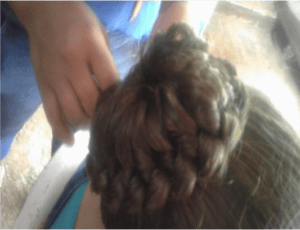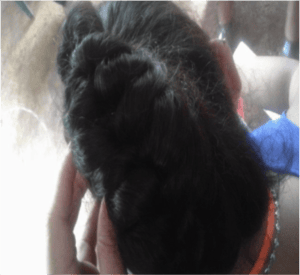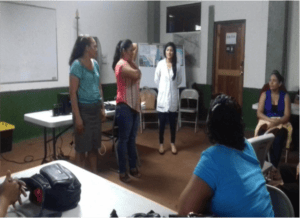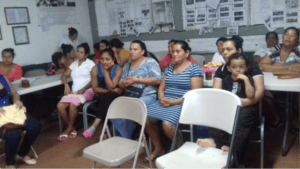
As part of our ongoing training and advising, as well as micro-loan disbursement and collection, SHI micro-credit officers Yolanda and Aracelly regularly travel to each community served through the micro-credit program. And on one recent visit to Las Azucenas, they began to notice something new: there was a new energy in the community. A new curiosity.
As they were visiting homes of the women who had been active in the micro-credit program for a while and  were nearing graduation, their neighbors began to gather to witness the training sessions and listen to the advice given. Yolanda and Aracelly invited the neighbors in, and taught all gathered about several business skills that would benefit their small enterprises.
were nearing graduation, their neighbors began to gather to witness the training sessions and listen to the advice given. Yolanda and Aracelly invited the neighbors in, and taught all gathered about several business skills that would benefit their small enterprises.
For those who were more mature in the program, Aracelly and Yolanda introduced the concept of starting a community bank so that the women could begin pooling their savings and lending to one another. That way, as they grow their own profits, they can lend out their savings to other women in the community. Plus, since the group sets their own rules, they could opt to issue loans of higher value than Self-Help’s current maximum. The women were excited to learn about the opportunity to still maintain their relationship with the micro-credit officers and receive consulting if needed, but also to have the ability to achieve self-sufficiency while still receiving helpful skills training.

More fun hairdos
A few weeks later, the two micro-credit officers returned to the small, rural community of Las Azucenas to host a beauty workshop for the daughters of the micro-credit beneficiaries. They wanted to demonstrate that the girls could also be a part of the program by helping their mothers and to give all gathered the chance to feel pampered. By learning how to do their own hair and makeup, the girls can spend less at salons in the area for services for important life events such as quinceaneras and weddings. During the training session, they learned how to trim, style, and brush their hair. The girls were eager to learn the different styles and spent the day practicing on each other. The teen girls and their mothers would then use these skills to generate income by charging others in the area small amounts to do their hair.

The health demonstration
The most recent training for the women of Las Azucenas was hosted at the training center rather than their communities and focused not on business management or learning new skills, but on health. Thirty women attended the training, led by a doctor and a nurse from the local Ministry of Health. They taught the women preventative measures to maintain their health, educated them about sexual infections, discussed signs for early detection of breast and uterine cancer, and taught which signs and symptoms were reasons to seek immediate help from a doctor. Five women came forward with symptoms to seek help and learn how to better care for their bodies. Mammograms were performed for free for the women who attended. After the training, a visit was arranged to Laurel Galan Health Center, so that the women could also

Women learning about the importance of healthcare
receive a free pap smear test to follow through on the encouragement to get regular preventative health care screening. Our country program director, Jorge, provided transportation for the women and drove each of them to and from the clinic to the training center. The Nicaragua SHI staff also used one of the new and improved stoves to make lunch for all of the women after the training sessions. The SHI staff said they felt satisfied knowing that the women were not only receiving help to improve their economic obstacles, but also receive basic important services to improve their health so that they can face any obstacle in life. At the end of the training, the women expressed their gratitude, and said that after meeting the doctors in person in a more relaxed setting that day, they now feel comfortable visiting the clinic on their own when they need to in the future.
Thank you for your support of the women of Las Azucenas – from training in business management, to accessing micro-loans, to ensuring they’re healthy enough to run their businesses – you’re truly pairing education with the resources to put that education into action. Thank you!

Powered by Wapiti Digital #servetheherd
This is my rich text.
This is more rich text.
I am a list
Lists are cool